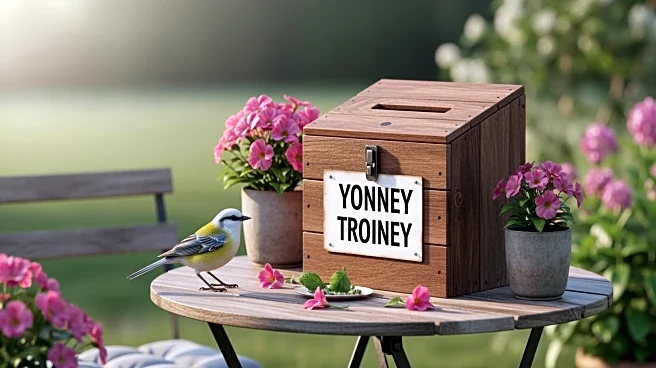What's Happening?
Honesty boxes, traditionally used for cash transactions in rural areas, are experiencing a resurgence as small businesses adapt them for modern payment methods. These boxes, often found on rural lay-bys,
offer local produce like eggs and apples in exchange for donations. Despite the decline in cash usage, many businesses are flourishing by integrating QR codes for online payments. Annabelle Cox, owner of Dunk Cookies, has successfully used an honesty box to engage with her community and attract customers from afar. Her box, located on a school route, is frequently refilled and has become a local fixture. The use of social media to promote these boxes has expanded their reach, with customers traveling specifically to purchase goods. This trend is not limited to cookies; other products like oysters and dog treats are also sold through honesty boxes.
Why It's Important?
The adaptation of honesty boxes to include digital payment options reflects a broader shift towards cashless transactions in the economy. This change allows small businesses to reach a wider audience and potentially increase sales without relying on physical currency. The integration of technology into traditional business models demonstrates innovation and resilience among small business owners. It also highlights the importance of community engagement and local support in sustaining these enterprises. As cash usage declines, businesses that can adapt to digital payments may have a competitive advantage, while those reliant on cash may face challenges. The trend also raises concerns about accessibility for individuals who prefer or rely on cash transactions.
What's Next?
As the use of honesty boxes continues to grow, businesses may explore further technological integrations to enhance customer experience and security. The success of these boxes could inspire other small businesses to adopt similar models, potentially leading to a wider acceptance of cashless transactions in rural and local settings. Additionally, there may be discussions around ensuring inclusivity for those who are less comfortable with digital payments. Stakeholders, including local governments and community organizations, might consider supporting these initiatives to boost local economies and preserve traditional business practices.
Beyond the Headlines
The resurgence of honesty boxes with digital payments may influence cultural perceptions of trust and community interaction. As technology changes the dynamics of these transactions, there could be a shift in how people perceive honesty and transparency in business dealings. The nostalgic appeal of honesty boxes combined with modern technology might foster a unique blend of tradition and innovation, impacting consumer behavior and expectations.









